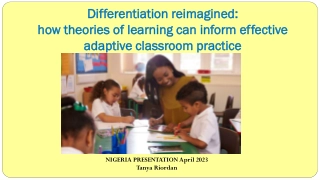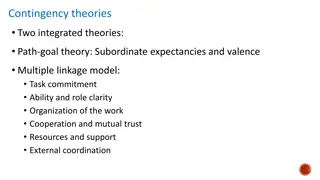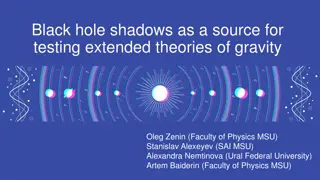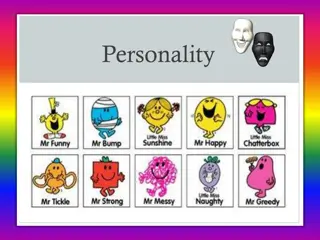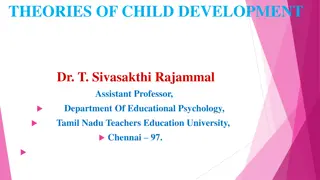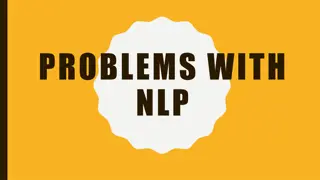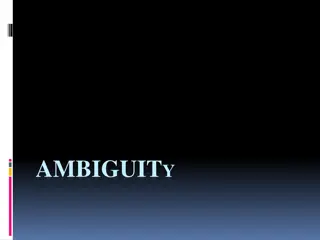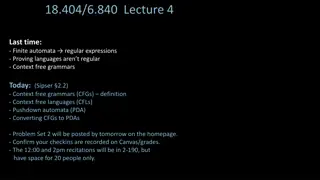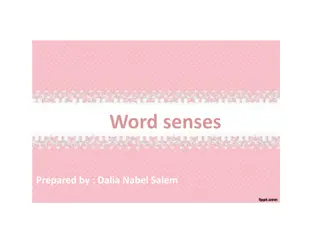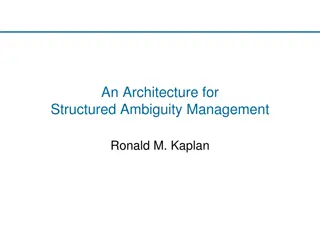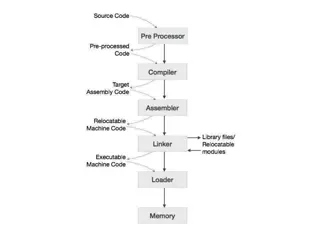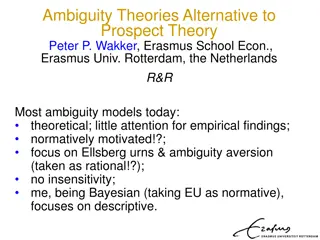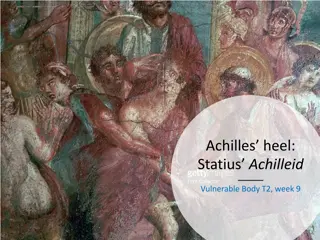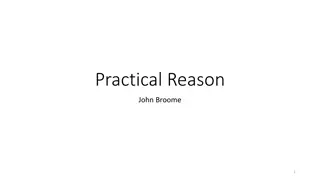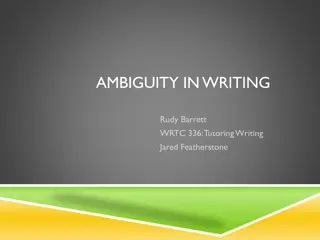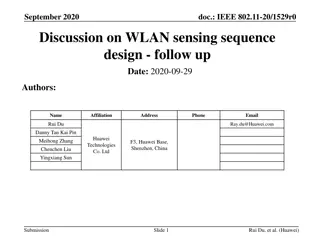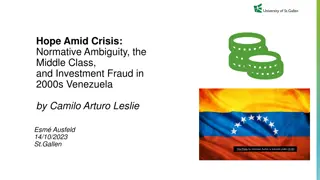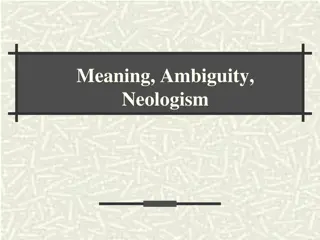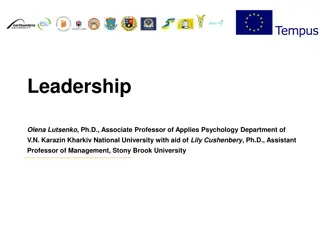Reimagining Differentiation: Enhancing Classroom Practice Through Learning Theories
Explore how theories of learning can inform effective adaptive classroom practice, focusing on the concept of differentiation. The presentation delves into reimagining differentiation, key theories supporting it, and practical strategies to support differentiation in language classrooms. The researc
0 views • 35 slides
Leadership Theories and Power Dynamics in Organizations
Explore contingency theories, dyadic theories, power and influence concepts, and leadership lessons from "12 Angry Men". Dive into the significance of leader-member exchange (LMX), political skills, and the interplay between power, politics, and organizational efficiency.
0 views • 27 slides
Theories Explaining Deviant Sexual Behavior Throughout History
Explore historical theories on deviant sexual behavior, including demonological, anomie, psychoanalytical, human ecology, and somatotyping theories. These theories range from supernatural beliefs of possession to scientific interpretations of societal influences and individual characteristics.
2 views • 33 slides
Testing Extended Theories of Gravity Using Black Hole Shadows
Exploring the shadows of black holes as a method to test extended theories of gravity, this study discusses the existence of black holes, gravitational wave astronomy, and direct imaging. Researchers Oleg Zenin, Stanislav Alexeyev, Alexandra Nemtinova, and Artem Baiderin present findings on black ho
5 views • 18 slides
Insights into Theories of Motivation and Their Application
Motivation, a driving force behind human behavior, is explored through various theories like Maslow's hierarchy of needs, McClelland's learned needs theory, and others. Understanding these theories can help organizations enhance worker productivity by addressing different motivational factors.
9 views • 21 slides
Understanding Key Nursing Philosophies and Theories
Explore the development of nursing philosophies and theories with a focus on prominent figures like Henderson, Orem, Roy, Rogers, Leninger, and Pender. Delve into the historical stages of philosophical development in nursing and the three schools of thought in nursing. Engage in group discussions an
10 views • 12 slides
Understanding Business Ethics Theories and Principles
Explore various business ethics theories including Ethical Concepts, Moral Behavior Development, Ethical Principles, and the Role of Ethics in Business. Delve into the concept of ethics, moral behavior evolution, ethical principles like autonomy, honesty, justice, and integrity, and the importance o
10 views • 17 slides
Managerial Theories and Criticisms
Delve into the world of management theories, from classical to modern approaches, exploring the foundational principles of management, the evolution of theories, and criticisms of traditional perspectives. Learn about the basic functions of management and the insightful perspectives of renowned theo
2 views • 11 slides
Understanding Personality: Theories, Types, and Assessment
Exploring the intricate world of personality, this comprehensive guide delves into major theories of personality development, assessment methods, cultural influences, and key contributors. Discover the different types of personalities, including Type A and Type B, and unravel the complexities of psy
1 views • 96 slides
Introduction to Organizational Behavior: Management Theories and Practices
Explore the evolution of organizational behavior from early management theories to contemporary practices. Understand the historical foundations and relevance of management theory in shaping workplace dynamics. Delve into key concepts like Scientific Management, Administrative Management, Bureaucrat
1 views • 28 slides
Understanding Theories of Child Development by Dr. T. Sivasakthi Rajammal
Child development theories such as Erikson's psycho-social theory, Piaget's cognitive development theory, and Kohlberg's moral development theory explain how children grow and change across different stages of childhood. These theories focus on various aspects of development including social, emotio
0 views • 27 slides
Psychological Theories of Criminality: Understanding the Roots
Psychological theories of criminality delve into the association between intelligence, personality, learning, and criminal behavior. Major theories include Psychodynamic Theory by Freud, Behavioral Theory by Bandura, and Cognitive Theory by Kohlberg. These theories explore how unconscious mental pro
1 views • 20 slides
Exploring Leadership Theories: Traits and Behaviors
Leadership theories have evolved from trait theory focusing on personal qualities to behavioral theories emphasizing actions and interactions. While early research sought universal traits for leadership, it encountered challenges due to varied traits among leaders and non-leaders. Behavioral theorie
2 views • 29 slides
Understanding Ambiguity in Natural Language Processing (NLP)
Natural Language Processing (NLP) faces challenges with ambiguity, which occurs due to multiple possible interpretations of language input. Humans can often resolve ambiguity, but it's complex for computers. Types of ambiguities include lexical, syntactic, pragmatic, referential, and transient. Over
2 views • 24 slides
Unraveling COVID-19 Conspiracy Theories and Hoaxes
Exploring various conspiracy theories surrounding the origins of COVID-19, from bat soup to bioweapons and espionage. Dive into wilder theories involving population control, world war, and even Disney's supposed predictions. Understand the differences between conspiracy theories and hoaxes, shedding
2 views • 11 slides
Understanding Ambiguity in English Language
Exploring the concept of ambiguity in the English language, this article delves into the various meanings words can convey, the challenges of ambiguity resolution, and the types of ambiguity such as lexical and structural ambiguity. Examples of homonymy and homophony are provided to illustrate how w
2 views • 27 slides
Understanding Sociological Theories and Frameworks
Sociological theories, encompassing micro and macro perspectives, provide a lens to interpret societal dynamics. Consensus theories like functionalism emphasize shared norms, while conflict theories such as Marxism highlight social inequalities. Social action theories like interactionism focus on in
3 views • 21 slides
Understanding Context-Free Grammars (CFGs) and Pushdown Automata
Exploring Context-Free Grammars (CFGs) and Pushdown Automata, covering definitions, examples, ambiguity, and conversions. Learn about generating strings, CFG formal definitions, ambiguity in grammars, and more. Connect with the basics of context-free languages and their relations to PDAs. Dive into
0 views • 13 slides
Online Seminar: Theories of Learning in Initial Teacher Education
This collection of online seminar slides introduces pre-service teachers to major theories of learning, including the Science of Learning through cognitive neuroscience. The presentation aims to help educators consider implications for teaching, recognize theories in action, and pose critical questi
1 views • 11 slides
Theories of Causation in Psychological and Social Sciences
Overview of theories of causation categorized into psychological, social psychological, and sociological perspectives. Psychological theories focus on instinctive, biological, and psychological qualities of abusers, including Attachment Theory, Psychodynamic Theory, Social Learning Theory, and Situa
0 views • 15 slides
Introduction to Quantum Chromodynamics & Field Theories in High-Energy Physics
Explore the fundamentals of Quantum Chromodynamics and Classical Field Theories in this informative lecture, covering topics such as global and local symmetries, Lagrangians, actions, and dynamics. Understand the significance of global and local symmetries in classical field theories, along with exa
2 views • 17 slides
Comprehensive Overview of Student Affairs Theories
This collection explores key theories in student affairs, including cognitive-structural theories, learning theories, and person-environment theories. Cognitive-structural theories delve into how individuals process information, while learning theories examine how people absorb knowledge. Person-env
3 views • 19 slides
Understanding Theories and Concepts in Research
The content delves into the fundamental concepts of theories and variables in research. It discusses the nature of theories, including descriptive, explanatory, and predictive theories. Additionally, it examines the role of concepts in providing identity and meaning to objects and phenomena. Through
2 views • 55 slides
Classical Trade Theories and Their Limitations in International Economics
Classical trade theories such as the Theory of Absolute Advantage by Adam Smith and the Theory of Comparative Advantage by David Ricardo highlight the benefits of free trade and specialization based on natural advantages. However, these theories have limitations, such as the inability to explain sce
0 views • 8 slides
Applying Theories and Models in Integrated Health: Module 3 Overview
This module delves into the application of various theories, perspectives, and practice models in integrated healthcare. Students will learn to utilize different theories to enhance their understanding and practice in integrated health, focusing on aspects like personal impact, behavioral change the
0 views • 78 slides
Understanding Polysemy and Homonymy in Lexical Ambiguity
In lexical ambiguity, polysemy refers to one word having multiple related senses, while homonymy involves different words that sound the same but have unrelated meanings. Distinguishing between polysemy and homonymy can be challenging, but certain guidelines can help differentiate them based on shar
0 views • 27 slides
Managing Ambiguity in Language: An Innovative Approach
Language presents challenges due to its inherent ambiguity, making it difficult to map between form and meaning. This content discusses an architecture for structured ambiguity management, emphasizing the complexities of linguistic interpretation, modular mapping from text to meaning, and the pervas
0 views • 31 slides
Accelerating Lemma Learning Using Joins in Satisfiability Modulo Theories
Explore the use of joins in accelerating lemma learning within the context of Satisfiability Modulo Theories (SMT). The study covers various SMT applications at Microsoft and delves into the development of the Z3 solver. Key topics include theories, arithmetic operations, array theory, uninterpreted
0 views • 25 slides
Understanding Issues in Context-Free Grammar: Ambiguity, Precedence, Associativity, and More
Delve into the complexities of context-free grammar, exploring concepts such as ambiguity, precedence, associativity, left recursion, and left factoring. Learn about the challenges posed by left recursion and the differences between ambiguous and unambiguous, as well as deterministic and non-determi
0 views • 7 slides
Ambiguity Theories as Alternatives to Prospect Theory
This article explores ambiguity theories as alternatives to Prospect Theory, focusing on decision-making under uncertainty. It discusses the Anscombe-Aumann framework, multiple priors models, and applications of ambiguity models. The popular Anscombe-Aumann framework is detailed, with a two-stage ap
0 views • 29 slides
The Complex Themes of Vulnerability and Ambiguity in Statius's Achilleid
Exploring the intricate narrative of Statius's Achilleid, this analysis delves into the vulnerability of Achilles and Thetis's attempts to mitigate it, challenging the traditional epic genre through hybridity and ambiguity. The thematic interplay of divine-human dynamics, gender ambiguity, and the c
0 views • 14 slides
Theories and Concepts in Semantics: Classical vs. Prototype Approaches
Explore different theories of concepts in semantics, including classical theories based on necessary and sufficient conditions, causal theories, and prototype theories. Compare their strengths and limitations in handling fuzziness, asymmetry, and internal structure of concepts. Discover how experime
1 views • 46 slides
Exploring the Ambiguity of Reason in Philosophy Through Historical Perspectives
The ambiguity and complexity surrounding the concept of reason are delved into through the historical lenses of John Broome and David Hume. From the early uses of "reason" in English to its normative implications in moral philosophy, this exploration sheds light on the multifaceted nature of reason
0 views • 21 slides
Integrating Theories and Models for Enhanced Health Practice
Explore the application of theories, perspectives, and practice models in integrated health through Module 3. Learn how theories guide assessment, treatment, and patient outcomes. Discover common theories enhancing assessment and supporting individuals through grief and loss. Gain insights into the
0 views • 78 slides
Comprehensive Overview of Leadership Theories and Styles
Leadership encompasses the ability to influence a group towards achieving goals by knowing oneself, communicating vision, building trust, and taking effective action. Various leadership styles include Autocratic, Democratic, Free-Rein, and Paternalistic, each with distinct decision-making approaches
0 views • 19 slides
Understanding Ambiguity in Writing: Types and Examples
Explore the different types of ambiguity in writing, including lexical, syntactic, and structural ambiguity. Learn how awkward wording, dangling modifiers, and crash blossoms can lead to confusion in writing. Discover ways to identify and address ambiguity in your own writing to improve clarity and
0 views • 15 slides
Analysis of WLAN Sensing Sequence Design Using Ambiguity Function and Range-Doppler Map
In this document, the authors from Huawei discuss the analysis of employing the ambiguity function for WLAN sensing sequence design. They delve into the ambiguity function's definition, analysis, and its comparison with the range-Doppler map. The document highlights the importance of ambiguity funct
0 views • 15 slides
Hope Amid Crisis: Normative Ambiguity, the Middle Class, and Investment Fraud in 2000s Venezuela
The study delves into the impact of Stanford Financial Group's investment scheme in Venezuela between 1986-2009, particularly on the middle-class Venezuelans. It explores how normative ambiguity affected the financial decisions of middle-class individuals, highlighting the interplay between futurity
0 views • 10 slides
Understanding Ambiguity in Translation Theory
Exploring the complexities of ambiguity in translation theory, this content delves into the nuances of meaning, neologisms, and the challenges faced by translators in deciphering text. It discusses the various types of ambiguity, such as lexical and semantic, highlighting their impact on language in
0 views • 27 slides
Understanding Leadership Theories and Styles
Leadership involves influencing a group towards a common goal. Traits, interaction styles, and group dynamics play vital roles in effective leadership. Various theories, such as Trait Theories and Synthetic Leadership Theories, provide insights into different aspects of leadership. Understanding lea
0 views • 41 slides
